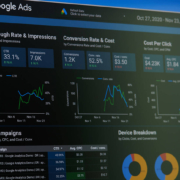What’s the Buzz About SEO Audits?
Your small business has recently launched a new site. Good job! Now you need to see if this part of your digital marketing plan is working. There’s only one problem: you don’t know how to figure that out. Don’t fret; our SEO experts are here to save the day and help you through this.
You need an SEO audit. Don’t freak out – it’s not bad. Many factors affect a site’s position in search results, but some simple tweaks can make a big difference. In this blog, we’ll break down what the SEO audit process is so your brand can be as awesome as us – uh, you.
What’s an SEO Audit?
You might have heard the term SEO audit, but do not know what it means or why you would need one. It’s an in-depth look at your website’s search engine optimization (SEO) performance, strengths, weaknesses, and anywhere you can get better. These audits tell you if your website is geared for search engine ranking factors. You want to rank high in search engine results pages (SERPS), which helps you gauge how your target audience uses your website.
A complete SEO audit will analyze both on-page elements (like content) as well as off-page elements (such as links). It also helps because Google likes to change up algorithms. Once you have an idea of what Google is thinking, an audit just makes sure your website’s SEO does its job to get you noticed.
You want a technical SEO audit when you’ve launched a new website or changed something about the site you already have that could impact search engine rankings, like adding new content or changing up the keywords on product pages. Another reason is to find ways to increase traffic from organic searches by improving your page position or click-through rate (CTR).
A Quick SEO Reminder
Yeah yeah, we know, we talk about SEO strategy a lot. But it’s only because it’s that important. SEO is all the stuff you do so your brand’s website shows up in Google and other search engine ratings.
How Often Do I Need an SEO Audit?
That’s a good question. The answer is: it depends. If your website is constantly publishing new content and changing how people engage with it, audit at least twice a year. If not, once every six months should be fine for most businesses.
This can vary depending on the size of your business, too. If you’re an e-commerce site with thousands of products and thousands of pages, obviously, a site audit will take some time.
A pretty big goal should be to drive organic traffic to your website. Focusing on target keyword research, meta tags, alt tags, and other key components of your website can help identify SEO issues. Conducting SEO audits help you stay fresh because like algorithms, SEO best practices change on the reg.
How Should an SEO Audit Look?
There are key points your audit will analyze, from the site speed of each web page to SEO ranking to how the site looks on mobile devices.
Your checklist should include:
- Metadata (meta descriptions, title tag, keywords)
- Crawlers
- Mobile usability
- XML Sitemap (How many pages exist on your site?)
- Technical SEO (All the internal links. Broken links are the 301 redirects, for example.)
- Page speed (Page load times)
- Title tags (HTML that is a clickable headline in a search)
- Headers (different headlines in content like a blog)
- Canonical website (no duplicate content or sites)
- Indexing
- Schema.org (HTML code that helps Google and other search engines understand your website’s content)
Check Your Socials
It’s important to know how your social media channels are performing. This is a version of off-page SEO, which is all the stuff that isn’t published on your website. Including social media in your SEO audit helps you see if you’re meeting any business goals you set out to achieve.
Also, keep in mind that promoting the content on your site leads to a better backlink game. That means other people will see your stuff, think you’re pretty smart, and link to your content. That’s trust, and we’re all about that.
Perks of SEO Audits
There are benefits to performing SEO audits throughout the year (besides everything we said above in this blog).
Get to know your conversions and return on investment (ROI). Not only can you improve your SEO ranking but also your user experience, which will lead to increased revenue.
SEO Tools to Get the Job Done
Check metrics and other data through different SEO audit tools, or checkers. These are online resources that do everything you’ve read about in this blog. Check your external links, page speed insights, and on-page SEO with Google Search Console, Google Analytics, Screaming Frog, and Google PageSpeed Insights, to give you some starters. Ahrefs is a great tool to see the keywords you rank for.
Robots.txt is another SEO testing tool to consider. It allows website owners to prevent search engines from indexing pages they don’t want in search results, like duplicate content, pages with sensitive information, or low-quality pages (which you shouldn’t have because you’ve planned your content out to be great already).
I’d Like an Audit… Do I Handle It?
While this SEO audit information all skims the surface – and trust us, it does – it can seem like a lot. No fear, your friends at Lift Marketing are here.
Trust us to use our site audit tools and SEO knowledge to get your brand where it should be – naturally boosted in SEO rankings. Don’t hesitate to reach out — we’ll handle the rest.











